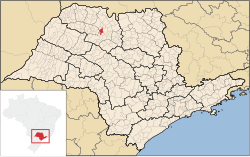Mirassol
Mirassol | |
|---|---|
 View of Mirassol | |
 Location of Mirassol | |
| Coordinates: 20°49′08″S 49°31′15″W / 20.81889°S 49.52083°W | |
| Country | |
| Region | Southeast |
| State | |
| Government | |
| • Mayor | José Ricci Júnior |
| Area | |
• Total | 243.161 km2 (93.885 sq mi) |
| Elevation | 587 m (1,926 ft) |
| Population (2020 [1]) | |
• Total | 60,303 |
| • Density | 250/km2 (640/sq mi) |
| Time zone | UTC−3 (BRT) |
| Postal Code | 15130-000 |
| Area code | +55 17 |
| Website | Prefecture of Mirassol, São Paulo |
Mirassol is a municipality in the state of São Paulo, Brazil. The city is located in the northern part of the state, 453 km from the city of São Paulo[2] and 15 km from São José do Rio Preto. Mirassol has 60,303 inhabitants (IBGE/2020).
The city belongs to the Microregion of São José do Rio Preto.
Geography
[edit]Neighbouring places
[edit]Mirassolândia, Ipiguá, São José do Rio Preto, Bady Bassitt, Nova Aliança, Jaci, Neves Paulista and Bálsamo
History
[edit]The city was founded on September 8, 1910, by Joaquim da Costa Penha, with the name of São Pedro da Mata Una. On November 27, 1919, the village changed its name to Mirassol, being elevated to district.
The city was officially established as a municipality on December 23, 1924.[3]
Economy
[edit]Mirassol has a relevant furniture industry, and 30% of the city's GDP comes from the Secondary sector. Commerce and services corresponds to 68% of the Economy.[4]
Demographics
[edit]| Year | Population |
|---|---|
| 2010 | 53,792 |
| 2011[4] | 54,343 |
The HDI, measured by the UNDP, was 0.822 in the year 2000. The life expectancy for the city is 75.42 years. The literacy rate, measured in 2000 by SEADE, was 92.35%.[4]
There weren't homicides in the year 2008. In 2007, Mirassol had 1 homicide.[5]
Statistics
[edit]- Area: 243.80 km2
- Urban area: 47.07 km2
- Population density: 221.22/km2 (IBGE/2010) - 222.90/km2 (SEADE/2011)
- Urbanization: 93.9% (2010)
- Sex ratio (Males to Females): 96.35 (2011)
- Birth rate: 12.43/1,000 inhabitants (2009)
- Infant mortality: 7.56/1,000 births (2009)
- Homicide rate: 0.0/100 thousand ppl (2008)
- HDI: 0.822 (UNDP/2000)
All statistics are from SEADE[4] and IBGE.[6]
Media
[edit]In telecommunications, the city was served by Telecomunicações de São Paulo.[7] In July 1998, this company was acquired by Telefónica, which adopted the Vivo brand in 2012. The company is currently an operator of cell phones, fixed lines, internet (fiber optics/4G) and television (satellite and cable).[8]
Transportation
[edit]The city is linked with the SP-310 (Rodovia Washington Luis) and SP-320 (Rodovia Euclides da Cunha) state highways. Mirassol has an airport for small planes.
Sports
[edit]
Mirassol Futebol Clube, founded in 1925, is the city's football (soccer) club. The team's stadium is the Estádio Municipal José Maria de Campos Maia, which has a maximum capacity of 14,534 people.
Notable people
[edit]- André Renato Antoniassi, footballer
- Doriva, former footballer
See also
[edit]References
[edit]- ^ IBGE 2020
- ^ "Distance of Mirassol to the city of São Paulo". Google Maps. Retrieved 20 June 2012.
- ^ "History of the City on the Prefecture Site". Mirassol.sp.gov.br. Archived from the original on 4 September 2011. Retrieved 16 July 2011.
- ^ a b c d "Municipal Profile at SEADE" (in Portuguese). Fundação SEADE. Archived from the original on 23 August 2011. Retrieved 6 July 2011.
- ^ "Violence Map of Brazil". Mapa da Violência 2011 (in Portuguese). Archived from the original on 16 July 2011. Retrieved 6 July 2011.
- ^ "Population at "Censo 2010"" (PDF) (in Portuguese). IBGE.gov.br. Retrieved 6 Jul 2011.
- ^ "Creation of Telesp - April 12, 1973". www.imprensaoficial.com.br (in Portuguese). Retrieved 2024-06-14.
- ^ "Our History - Telefônica RI". Telefônica. Retrieved 2024-06-14.
External links
[edit]- (in Portuguese) Prefecture of Mirassol



